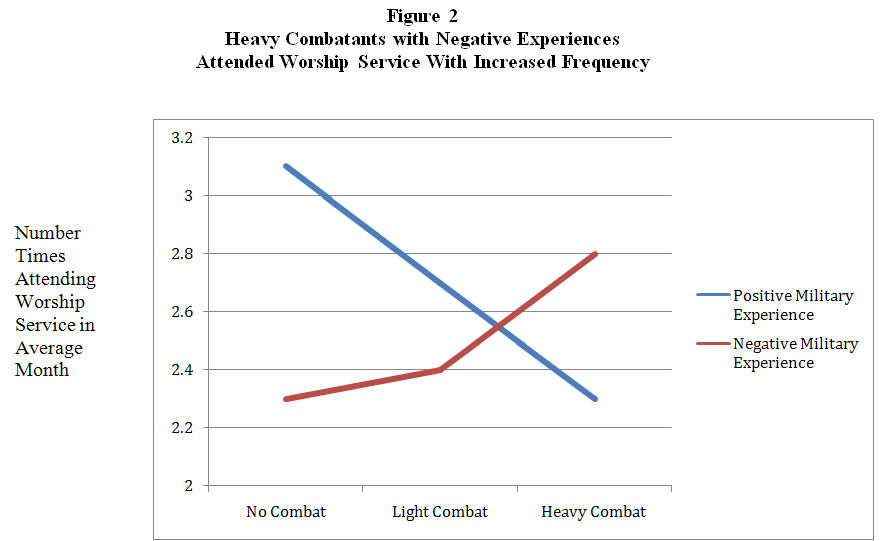Ernie Pyle, the iconic embedded World War II embedded journalist killed by Japanese machine gun fire in 1945, made famous the adage, "There are no atheists in foxholes."
He was making a point that it's better to be safe than sorry when your life is on the line - not letting the Devil get you cornered, he wrote, was the justification for a soldier who dug round foxholes. Atheists are a tiny minority anyway and there are even fewer in a war zone, Pyle felt. And he knew more soldiers than perhaps any journalist ever will.
But does war really transform people, or does it simply make the fleetingly religious more so for a short time? A recent analysis of archived surveys of Army Infantry soldiers after a battle - Samuel Stouffer's "The American Soldier" World War II research (1) - found self-reported reliance on prayer rose from 42% to 72% as that battle got more intense.
"The question is whether that reliance on faith lasts over time," said Craig Wansink, author and Professor of Religion at Virginia Wesleyan College, who did the analysis and co-wrote the paper with his brother Brian Wansink, food marketing expert and Professor of Applied Economics and Management at Cornell University. The World War II generation is a good one for analysis because the interest was religiosity long-term and young people in the 1940s were more religious overall than more recent generations.
A second analysis of survey results from 1,123 World War II veterans showed that 50 or more years after combat, most soldiers still exhibited religious behavior, though it varied by their war experience. Those facing heavy combat (versus no combat) attended church 21% more often if they claimed their war experience was negative, but those who claimed their experience was positive attended 26% less often.
The more a veteran disliked the war, the more religious they were 50 years later.

Credit: Craig Wansink. Source: Journal of Religion and Health
"We were interested in how people responded to heavy combat. In the face of heavy combat during WWII, an individual soldier likely prayed by himself. However, that emphasis on prayer, and the shared negative experience with others, ends up resulting in soldiers having increased church membership and attendance, particularly if they saw their military experience in negative terms," wrote Craig Wansink in an email.

Foxholes make for lousy atheists. Brian Wansink of Cornell poses with a Silver Star medal, the third highest military decoration for valor in the USA.(2) It's luckily not his own. A lot of them are awarded posthumously. With Memorial Day coming up, veterans think it's a whole lot better to be remembered on Veteran's Day instead. Credit: Jason Koski, Cornell Press Office
"What surprised me about that data was that in heavy combat not only was there greater trust in power beyond this--or the soldiers' immediate--world, but there also was less trust in personal and nationalistic ideals. During war, soldiers may be motivated by appreciation of freedom, by hatred of enemies, or by the desire to go home, but during times of heavy combat, those factors decrease in significance and soldiers increasingly turn to prayer. What surprised me was not just that the emphasis on prayer dramatically increased, but that reliance on other ideals radically decreased," noted Craig Wansink.
The paper, forthcoming in the Journal of Religion and Health (no DOI or citation yet), notes that no causality can be assumed. "We can't claim, for instance, that combat made soldiers religious or, conversely, that religious soldiers hated combat," said Brian Wansink.
Still, there may be important implications for counselors, clergy, and health practitioners who work with combat veterans. Religious involvement may be as particularly meaningful for a combat veteran who has had a negative military experience.
"These are people who had intense, trusting relationships with others under fire," said Brian Wansink, "They recognize both the importance of community and the limitations of their own abilities. A social component might be more important to healing than we think. One Memorial Day gift you could give to a veteran might just be to say to them 'Thanks.'"
In the end, the generalization that there are no atheists in foxholes may be less of an argument against atheism than it is against foxholes, the authors conclude.
Footnote:
(1) Stouffer,S.A. et al. (1949). The American soldier:combat and its aftermath, Vol. II. Princeton, N.J: Princeton UniversityPress.
(2) Subsequent Silver Stars, for those rare individuals who receive them, add an oak-leaf cluster. Colonel David Hackworth's Silver Star has a whopping nine such clusters. Along with 2 Distinguished Service Crosses, 8 Bronze Stars and 8 Purple Hearts. He got shot at a lot. But he became critical of the Viet Nam War and he retired rather than face a court martial - for providing prostitutes for his troops. In the late 1990s, CBS News commentator Dan Rather, who never tired of impugning everyone in the military except John Kerry, alleged that Hackworth was exaggerating his service record because he was awarded a Ranger tab. Hackworth had his military records audited and it showed he did receive the Ranger tab in the 1950s, and it was in his military records, but in the recent era it was not valid. The audit also found that his official records incorrectly gave him an extra Distinguished Service Cross cluster and one fewer Silver Star cluster. The Executive Producer of CBS News apologized to him. A wise move, since Hackworth had over 90 decorations and Rather had a bad habit of reporting gossip as news by then.




Comments